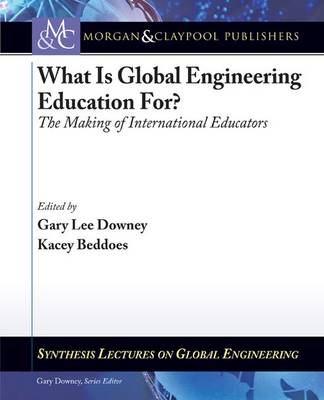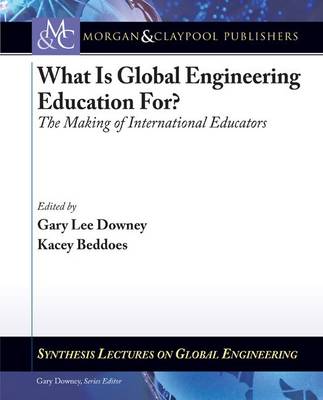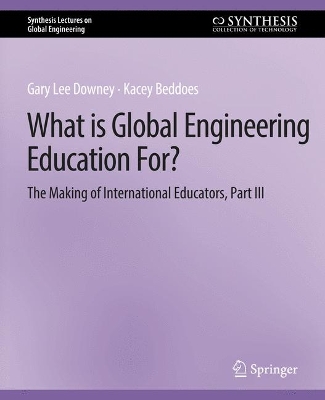Synthesis Lectures on Global Engineering
5 total works
What Is Global Engineering Education For?
by Gary Downey and Kacey Beddoes
Published 11 November 2010
Global engineering offers the seductive image of engineers figuring out how to optimize work through collaboration and mobility. Its biggest challenge to engineers, however, is more fundamental and difficult: to better understand what they know and value qua engineers and why. This volume reports an experimental effort to help sixteen engineering educators produce "personal geographies" describing what led them to make risky career commitments to international and global engineering education. The contents of their diverse trajectories stand out in extending far beyond the narrower image of producing globally-competent engineers. Their personal geographies repeatedly highlight experiences of incongruence beyond home countries that provoked them to see themselves and understand their knowledge differently. The experiences were sufficiently profound to motivate them to design educational experiences that could challenge engineering students in similar ways.
For nine engineers, gaining new international knowledge challenged assumptions that engineering work and life are limited to purely technical practices, compelling explicit attention to broader value commitments. For five non-engineers and two hybrids, gaining new international knowledge fueled ambitions to help engineering students better recognize and critically examine the broader value commitments in their work.
A background chapter examines the historical emergence of international engineering education in the United States, and an epilogue explores what it might take to integrate practices of critical self-analysis more systematically in the education and training of engineers. Two appendices and two online supplements describe the unique research process that generated these personal geographies, especially the workshop at the U.S. National Academy of Engineering in which authors were prohibited from participating in discussions of their manuscripts.
For nine engineers, gaining new international knowledge challenged assumptions that engineering work and life are limited to purely technical practices, compelling explicit attention to broader value commitments. For five non-engineers and two hybrids, gaining new international knowledge fueled ambitions to help engineering students better recognize and critically examine the broader value commitments in their work.
A background chapter examines the historical emergence of international engineering education in the United States, and an epilogue explores what it might take to integrate practices of critical self-analysis more systematically in the education and training of engineers. Two appendices and two online supplements describe the unique research process that generated these personal geographies, especially the workshop at the U.S. National Academy of Engineering in which authors were prohibited from participating in discussions of their manuscripts.
This book follows the fraught attempts of engineers to identify with Korea as a whole. It is for engineers, both Korean and non-Korean, who seek to become better critical analysts of their own expertise, identities, and commitments. It is for non-engineers who encounter or are affected by Korean engineers and engineering, and want to understand and engage them. It is for researchers who serve as critical participants in the making of engineers and puzzle over the contents and effects of techno-national formation.
What is Global Engineering Education For? The Making of International Educators, Part III
by Gary Downey and Kacey Beddoes
Published 11 November 2010
Global engineering offers the seductive image of engineers figuring out how to optimize work through collaboration and mobility. Its biggest challenge to engineers, however, is more fundamental and difficult: to better understand what they know and value qua engineers and why. This volume reports an experimental effort to help sixteen engineering educators produce ""personal geographies"" describing what led them to make risky career commitments to international and global engineering education. The contents of their diverse trajectories stand out in extending far beyond the narrower image of producing globally-competent engineers. Their personal geographies repeatedly highlight experiences of incongruence beyond home countries that provoked them to see themselves and understand their knowledge differently. The experiences were sufficiently profound to motivate them to design educational experiences that could provoke engineering students in similar ways.
For nine engineers, gaining new international knowledge challenged assumptions that engineering work and life are limited to purely technical practices, compelling explicit attention to broader value commitments. For five non-engineers and two hybrids, gaining new international knowledge fueled ambitions to help engineering students better recognize and critically examine the broader value commitments in their work.
A background chapter examines the historical emergence of international engineering education in the United States, and an epilogue explores what it might take to integrate practices of critical self-analysis more systematically in the education and training of engineers. Two appendices and two online supplements describe the unique research process that generated these personal geographies, especially the workshop at the U.S. National Academy of Engineering in which authors were prohibited from participating in discussions of their manuscripts.
Table of Contents: Communicating Across Cultures: Humanities in the International Education of Engineers (Bernd Widdig) / Linking Language Proficiency and the Professions (Michael Nugent) / Language, Life, and Pathways to Global Competency for Engineers (and Everyone Else) (Phil McKnight) / Bridging Two worlds (John M. Grandin) / Opened Eyes: From Moving Up to Helping Students See (Gayle G. Elliott) / What is Engineering for? A Search for Engineering beyond Militarism and Free-markets (Juan Lucena) / Location, Knowledge, and Desire: From Two Conservatisms to Engineering Cultures and Countries (Gary Lee Downey) / Epilogue - Beyond Global Competence: Implications for Engineering Pedagogy (Gary Lee Downey)
For nine engineers, gaining new international knowledge challenged assumptions that engineering work and life are limited to purely technical practices, compelling explicit attention to broader value commitments. For five non-engineers and two hybrids, gaining new international knowledge fueled ambitions to help engineering students better recognize and critically examine the broader value commitments in their work.
A background chapter examines the historical emergence of international engineering education in the United States, and an epilogue explores what it might take to integrate practices of critical self-analysis more systematically in the education and training of engineers. Two appendices and two online supplements describe the unique research process that generated these personal geographies, especially the workshop at the U.S. National Academy of Engineering in which authors were prohibited from participating in discussions of their manuscripts.
Table of Contents: Communicating Across Cultures: Humanities in the International Education of Engineers (Bernd Widdig) / Linking Language Proficiency and the Professions (Michael Nugent) / Language, Life, and Pathways to Global Competency for Engineers (and Everyone Else) (Phil McKnight) / Bridging Two worlds (John M. Grandin) / Opened Eyes: From Moving Up to Helping Students See (Gayle G. Elliott) / What is Engineering for? A Search for Engineering beyond Militarism and Free-markets (Juan Lucena) / Location, Knowledge, and Desire: From Two Conservatisms to Engineering Cultures and Countries (Gary Lee Downey) / Epilogue - Beyond Global Competence: Implications for Engineering Pedagogy (Gary Lee Downey)



